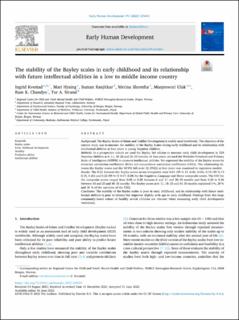The stability of the Bayley scales in early childhood and its relationship with future intellectual abilities in a low to middle income country
Kvestad, Ingrid; Hysing, Mari; Ranjitkar, Suman; Shrestha, Merina; Chandyo, Manjeswori Ulak; Chandyo, Ram Krishna; Strand, Tor Arne
Journal article, Peer reviewed
Published version

Åpne
Permanent lenke
https://hdl.handle.net/11250/3039911Utgivelsesdato
2022Metadata
Vis full innførselSamlinger
Sammendrag
Background The Bayley Scales of Infant and Toddler Development is widely used worldwide. The objective of the current study was to measure the stability of the Bayley Scales during early childhood and its relationship with intellectual abilities at four years in young Nepalese children. Methods In a prospective cohort we used the Bayley 3rd edition to measure early child development in 529 Nepalese children at 6–11, 18–23 and 30–35 months. At four years, we used the Wechsler Preschool and Primary Scale of Intelligence (WPPSI) to measure intellectual abilities. We expressed the stability of the Bayley scores by intraclass correlation coefficients (ICCs) and concordance correlation coefficients (CCCs). The relationship between the Bayley scores and the WPPSI full-scale IQ (FSIQ) at four years was examined in regression models. Results The ICCs between the Bayley scores across timepoints were 0.01 (95 % CI -0.06, 0.04), 0.19 (95 % CI 0.15, 0.26) and 0.22 (95 % CI 0.17, 0.28) for the Cognitive, Language and Motor composite scores. The CCC for the composite scores ranged from 0.05 to 0.20 between 6 and 11 and 30–35 months and from 0.20 to 0.36 between 18 and 23 and 30–35 months. The Bayley scores at 6–11, 18–23 and 30–35 months explained 3 %, 20 % and 36 % of the variation of the FSIQ. Conclusion The stability of the Bayley scales is poor in early childhood, and its relationship with future intellectual abilities is poor in infancy but improves slightly with age in early childhood. Findings from this large community-based cohort of healthy at-risk children are relevant when measuring early child development worldwide.
